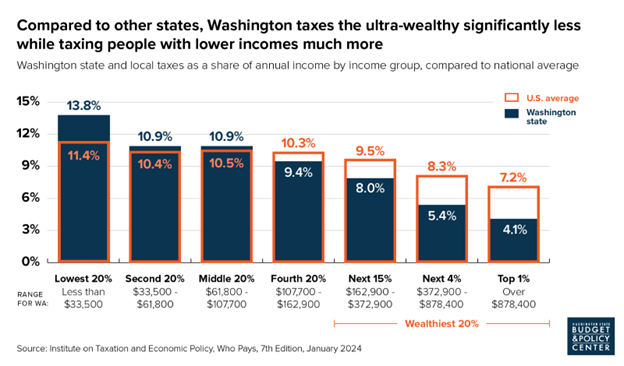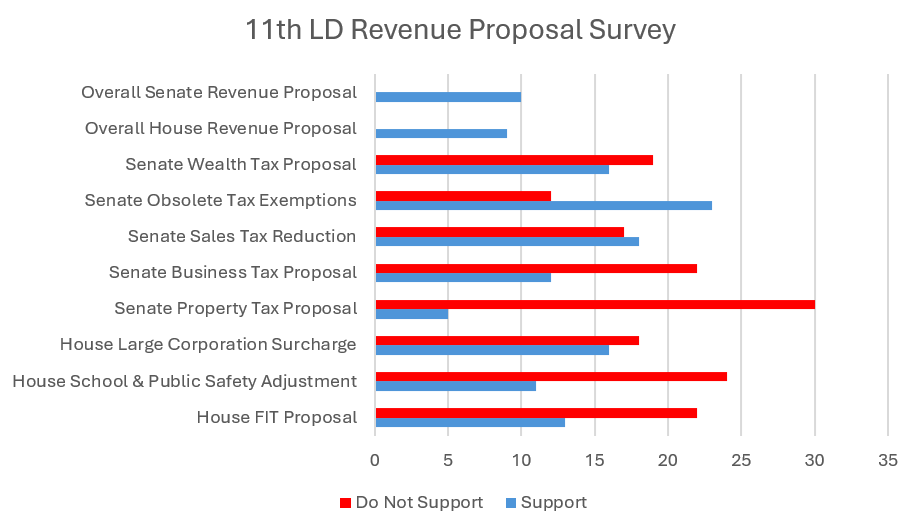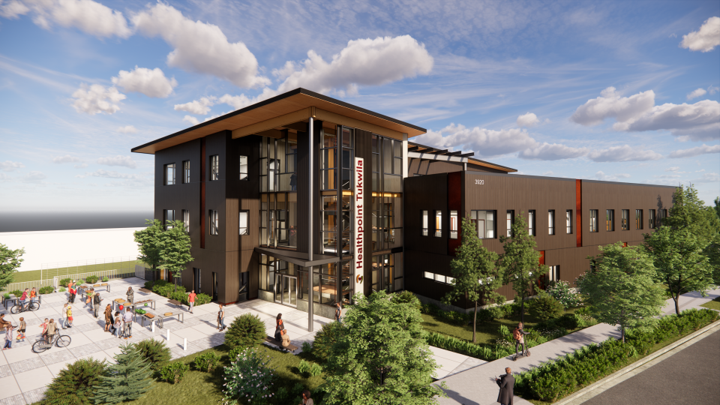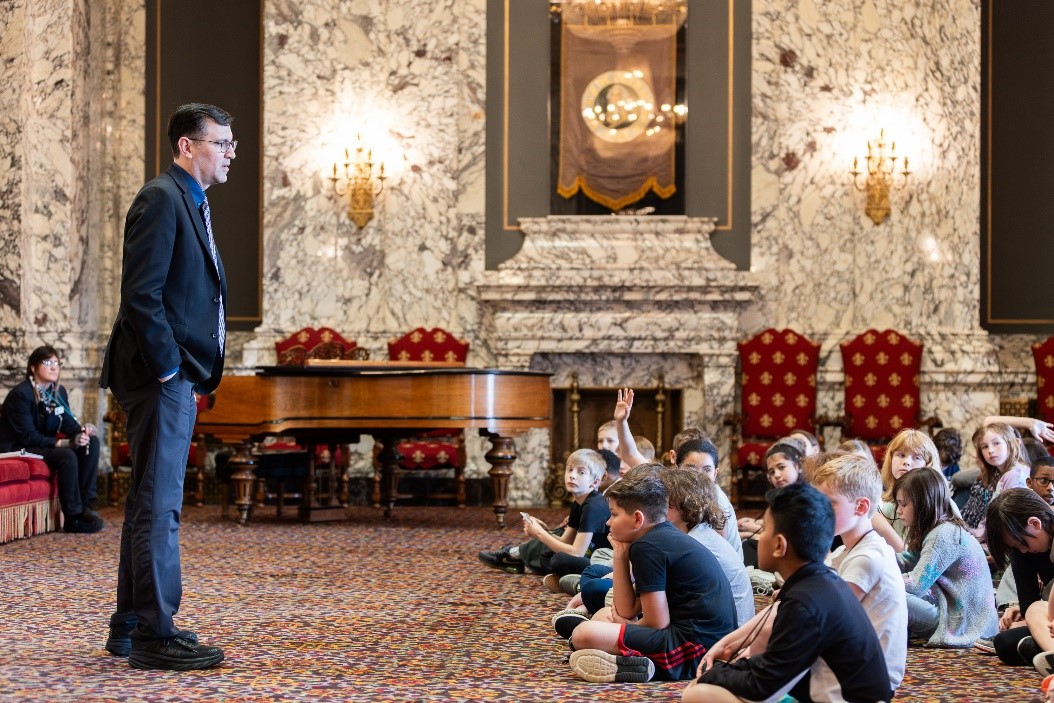Dear Friends and Neighbors,
As you know by now, Washington is facing a budget shortfall, and the decisions we make in the coming days will determine who shoulders that burden. For too long, our state’s tax system has placed a disproportionate load on working families while allowing the wealthiest residents and largest corporations to contribute far less than their fair share. This moment gives us an opportunity—and a responsibility—to finally move toward a more balanced and equitable approach.
Progressive revenue is not just a tool for patching budget gaps. It’s about creating a stronger foundation for all Washingtonians by ensuring we can invest in what matters most: quality public schools, access to healthcare, modern infrastructure, and a reliable safety net.

These are the essentials that make our communities resilient and prosperous. By updating our outdated tax code, we can ease the pressure on working families and ensure that those who have benefited most from our economy contribute fairly to the systems that helped them succeed.
Your Feedback on Revenue

Last week, I shared a survey asking for your input on a package of revenue proposals aimed at making our tax code more fair. Many of these ideas were developed with the goal of ensuring stable funding for essential services—like schools, housing, and public safety—without continuing to rely so heavily on lower- and middle-income families. However, your feedback showed limited support for proposals like the Financial Intangible Assets Tax, which would apply only to the richest 0.05% of taxpayers, or a surcharge on corporations earning over $250 million annually. Proposals to increase funding for K-12 education through progressive means also received little support.
The only ideas that gained broader support were lowering the sales tax and repealing outdated tax exemptions. While I understand the appeal of reducing the sales tax—especially given how regressive it is—it’s important to be honest about the tradeoffs. Reducing the sales tax by even a small percentage would cost the state approximately $1.3 billion, significantly deepening our budget deficit.
Without other fair sources of revenue, that would lead to painful cuts in services that working families and vulnerable communities depend on. Meanwhile, proposals to ask more from those at the top—who currently contribute proportionally far less—would help relieve the strain many families feel while ensuring those with the greatest means are doing their part.
Between the proposals from the House and Senate, respondents expressed marginally more support for the Senate’s version. Over the next 19 days, both chambers will work to reconcile their budget differences. Bills that pass both the House and Senate will move to the Governor’s desk for approval.
I remain committed to advocating for a final budget that reflects our community’s values, making sound investments in housing, transportation, education, and public safety while remaining fiscally responsible.
Capital & Transportation Budget Update
This year’s capital budget shows what’s possible when we prioritize the common good. We’re committing more than $1 billion to modernizing public schools across the state—from rural communities to urban districts—so every child has a safe and supportive place to learn.
We’re also investing $723 million in affordable housing, $470 million to improve behavioral health infrastructure, and significant funding for early learning centers and community hubs that strengthen families and neighborhoods.
Here in the 11th Legislative District, the capital budget includes over $30 million in targeted investments that reflect our commitment to community resilience, health, education, and housing.

One key investment is $1.03 million for Health Point in Tukwila, expanding dental care access through a new dental capacity grant. This will help provide much-needed oral health services to families who currently face barriers to care. Alongside this, the Tukwila Health & Wellness – Integrated Health project is receiving $1.03 million to deliver comprehensive and culturally responsive care—ensuring mental and physical health services are available and accessible for all.
We are also supporting affordable housing with a $2.5 million investment in the Griffin Campus Affordable Housing project, helping address rising housing costs and ensuring more families can find safe, stable places to live. Additionally, the Starfire Commons project is receiving $2.55 million to support community-centered housing and services. This budget also uplifts community institutions. The Somali Community & Cultural Innovation Hub is receiving $2.5 million to provide vital services and cultural space for a growing and historically underserved community.
In higher education, Renton Technical College is receiving more than $4.4 million across multiple categories—including facility repairs, infrastructure replacement, preservation, program improvements, and roof repairs. These investments ensure our local workforce development institutions remain strong and modernized.
Transportation is another key focus this year. One urgent need is the 42nd Street bridge, which has been reduced to one lane after being struck by a truck. It currently holds a safety rating of just 7 out of 100. The Senate budget includes $17 million in funding to complete repairs—leveraging $12 million in federal funds that we risk losing if the project is delayed. Unfortunately, the House proposal currently pushes this critical repair out to 2031. I strongly believe we cannot afford to wait.
These are the kinds of investments that reflect our shared values—sustainability, equity, and opportunity for all. But without fair and forward-looking revenue solutions, we risk deepening wealth inequality and placing more strain on those already doing the most to keep our communities running.
As we move through these final weeks of session, I want to hear from you. Your voice helps shape my advocacy in Olympia. Please take a moment to share your thoughts on the projects mentioned in this newsletter that matter most to you by completing this short survey. I’ll review your responses and provide an update soon.

Thank you, as always, for the opportunity to represent you and our community it. It is an honor to serve the 11th Legislative District.
Sincerely,
![]()
Rep. Steve Bergquist

